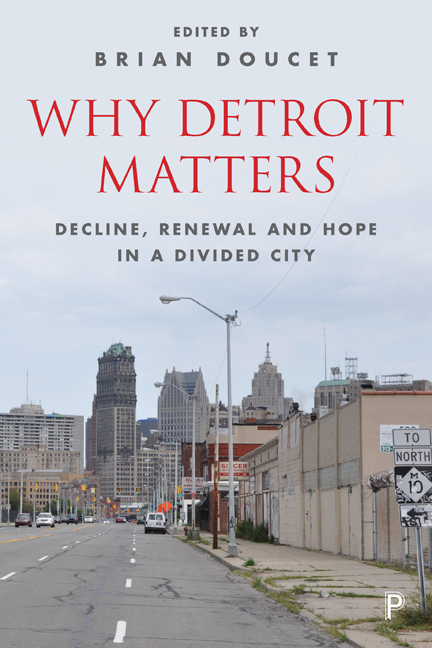Book contents
- Frontmatter
- Contents
- List of contributors
- List of figures and tables
- Acknowledgments
- one Introduction: why Detroit matters
- Section One Lessons from Detroit
- Intermezzo I You may not know my Detroit
- Section Two Practices from Detroit
- Intermezzo II My Detroit
- Section Three Conversations from Detroit
- References
- Index
three - Detroit in bankruptcy: what are the lessons to be learned?
Published online by Cambridge University Press: 05 April 2022
- Frontmatter
- Contents
- List of contributors
- List of figures and tables
- Acknowledgments
- one Introduction: why Detroit matters
- Section One Lessons from Detroit
- Intermezzo I You may not know my Detroit
- Section Two Practices from Detroit
- Intermezzo II My Detroit
- Section Three Conversations from Detroit
- References
- Index
Summary
Reynolds Farley, another long-standing scholar on Detroit, takes a more optimistic view of Detroit's current situation. In this chapter, he argues that Detroit's emergence from bankruptcy leaves the city in a far stronger position than it has been for some time. As in Galster's chapter, Farley provides insightful analysis of, and context for the city's decline, with this chapter focusing more on recent events, rather than Galster's long-term perspective. It also outlines some of the background and legality of a municipal bankruptcy. Farley argues that municipalities have a brighter future after emerging from bankruptcy. He highlights some of the spin-offs of government departments such as Eastern Market and Belle Isle, a point further elaborated upon by John Gallagher (Chapter Nine) and Dan Carmody (Chapter Nineteen). However, such optimism is also challenged through conversations with Sandra Hines (Chapter Seventeen) and Yusef Bunchy Shakur (Chapter Twenty-four), highlighting the often contentious nature of governance change in the City of Detroit.
However, Farley is also critical of the way in which local governments are financed, particularly in the State of Michigan, which he argues has augmented Detroit's financial predicament. In America, cities are creatures of the state and Farley contends that the century-old Michigan Home Rule Law is no longer fit for purpose. The chapter also takes us through Detroit's history of racial segregation and how Detroit's recent population exodus means that many middle-class African-Americans now live in the suburbs. Farley ends by questioning the planning logic of continued population and economic growth, arguing that new approaches are necessary to deal with decline. He asks whether the federal government needs to become active in supporting cities through revenue sharing once again.
Reynolds Farley is an Emeritus Professor and demographer at the University of Michigan's Population Studies Center. His extensive research focuses on racial and urban issues. He is an author of Detroit Divided (with Sheldon Danziger and Harry J. Holzer, Russell Sage Foundation, 2000) and maintains the website www.Detroit1701.org. His current work examines the residential consequences of the revitalization of Rust Belt cities.
Introduction
Detroit's city government ran out of funds to pay its bills in early 2013. Emergency Manager Kevyn Orr, with the approval of Michigan Governor Snyder, sought and received bankruptcy protection from the federal court.
- Type
- Chapter
- Information
- Why Detroit MattersDecline, Renewal and Hope in a Divided City, pp. 51 - 74Publisher: Bristol University PressPrint publication year: 2017



